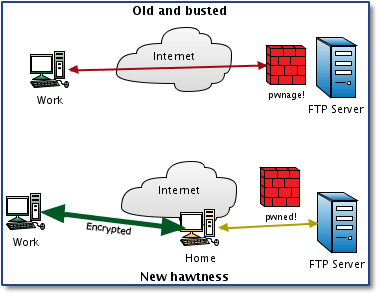
Sony release PS3 frimware update 3.21 which remove OtherOS feature, may PS3 users install linux on their PS3, if they install this FW update they will not be able to use their linux, but if they didn't install the update they will not be able to login to PSN (PlayStation Network) and play online games.
so we are going to bypass this update and login to PSN with the old FW 3.15
first we need to get some information's about PS3 update servers and base on what
it say you are out of date any need to update.
install apache with mod_proxy on your linux machine:
$ sudo yum install apache2 mod_proxy
then open apache config file "/etc/httpd/conf/httpd.conf" and add those mod_proxy configuration lines
(some times you may find them there by default, you just need to unhash them)
ProxyRequests On
ProxyVia On
Order deny,allow
Deny from all
Allow from 192.168.1
run the apache on usr box, and configure you PS3 to use your box as proxy server.
try to login to PSN and read your apache log file and see what is going on:
$ sudo tail -f /var/log/httpd/access_log
I found that my PS3 is trying to get a file "ps3-updatelist.txt" from PS3 Asian update server "http://fjp01.ps3.update.playstation.net"
192.168.1.16 - - [06/Apr/2010:10:05:21 +0400] "GET http://fjp01.ps3.update.playstation.net/update/ps3/list/jp/ps3-updatelist.txt HTTP/1.1" 200 252 "-" "PS3Update-agent/1.0.0 libhttp/1.0.0"
lets open "ps3-updatelist.txt" file and see its content:
# JP
Dest=83;CompatibleSystemSoftwareVersion=3.2100-;
Dest=83;ImageVersion=0000a20e;SystemSoftwareVersion=3.2100;
CDN=http://djp01.ps3.update.playstation.net/update/ps3/image/jp/2010_0401_3a08ef6164a7770ae3e7d5b9f366437a/PS3UPDAT.PUP;CDN_Timeout=30;
now lets trick our PS3 and hijack the traffic.
lets download this file on our apache server and change the FW version to 3.1500,
create the same original path on you apache server "/update/ps3/list/jp/"
$ cat /var/www/html/update/ps3/list/jp/ps3-updatelist.txt
# JP
Dest=83;CompatibleSystemSoftwareVersion=3.1500-;
Dest=83;ImageVersion=0000a20e;SystemSoftwareVersion=3.1500;
CDN=http://djp01.ps3.update.playstation.net/update/ps3/image/jp/2010_0401_3a08ef6164a7770ae3e7d5b9f366437a/PS3UPDAT.PUP;CDN_Timeout=30;
then lets download any DNS server (dnsmasq, bind9,...etc), i will use dnsmasq.
$ sudo yum install dnsmasq
edit dnsmasq config file "/etc/dnsmasq.conf"
and add this line to it:
address=/fjp01.ps3.update.playstation.net/192.168.1.6
what we did here we tell the DNS server to forward any connection
from the PS3 update server to our apache IP address.
also add those line to the config file to enable the logs:
log-queries log-dhcp log-facility=/var/log/dnsmasq
also add this line to "/etc/resolv.conf":
nameserver 127.0.0.1
run dnsmasq:
$ sudo /etc/init.d/dnsmasq start
on your PS3 remove the proxy setting and make it auto detect,
and set the primary DNS to you IP address
then try to login to PSN, and you should be able to login to
PSN with your old FW 3.15
if you read dnsmasq logs you will see something like this:
$ tail -f /var/log/dnsmasq
Apr 6 14:50:20 dnsmasq[3795]: query[A] fjp01.ps3.update.playstation.net from 192.168.1.16
Apr 6 14:50:20 dnsmasq[3795]: config fjp01.ps3.update.playstation.net is 192.168.1.6
Apr 6 14:50:22 dnsmasq[3795]: query[A] getprof.ae.np.community.playstation.net from 192.168.1.16
Apr 6 14:50:22 dnsmasq[3795]: forwarded getprof.ae.np.community.playstation.net to 192.168.1.1
Apr 6 14:50:22 dnsmasq[3795]: reply getprof.ae.np.community.playstation.net is 198.107.129.125
Apr 6 14:50:25 dnsmasq[3795]: query[A] a4.ae.np.communication.playstation.net from 192.168.1.16
Apr 6 14:50:25 dnsmasq[3795]: forwarded a4.ae.np.communication.playstation.net to 192.168.1.1
Apr 6 14:50:26 dnsmasq[3795]: reply a4.ae.np.communication.playstation.net is 198.107.131.128
Apr 6 14:50:35 dnsmasq[3795]: query[A] static-resource.np.community.playstation.net from 192.168.1.16
Apr 6 14:50:35 dnsmasq[3795]: forwarded static-resource.np.community.playstation.net to 192.168.1.1
Apr 6 14:50:35 dnsmasq[3795]: reply static-resource.np.community.playstation.net is
Apr 6 14:50:35 dnsmasq[3795]: reply a02.cdn.update.playstation.org.edgesuite.net is
Apr 6 14:50:35 dnsmasq[3795]: reply playstation2.sony.akadns.net is
Apr 6 14:50:35 dnsmasq[3795]: reply a192.d.akamai.net is 88.221.217.66
Apr 6 14:50:35 dnsmasq[3795]: reply a192.d.akamai.net is 88.221.217.65
Apr 6 14:50:36 dnsmasq[3795]: query[A] getprof.ae.np.community.playstation.net from 192.168.1.16
Apr 6 14:50:36 dnsmasq[3795]: forwarded getprof.ae.np.community.playstation.net to 192.168.1.1
Apr 6 14:50:37 dnsmasq[3795]: reply getprof.ae.np.community.playstation.net is 198.107.131.117
Apr 6 14:50:40 dnsmasq[3795]: query[A] getprof.de.np.community.playstation.net from 192.168.1.16
Apr 6 14:50:40 dnsmasq[3795]: forwarded getprof.de.np.community.playstation.net to 192.168.1.1
Apr 6 14:50:40 dnsmasq[3795]: reply getprof.de.np.community.playstation.net is 198.107.130.125
Apr 6 14:50:48 dnsmasq[3795]: query[A] getprof.gb.np.community.playstation.net from 192.168.1.16
Apr 6 14:50:48 dnsmasq[3795]: forwarded getprof.gb.np.community.playstation.net to 192.168.1.1
Apr 6 14:50:49 dnsmasq[3795]: reply getprof.gb.np.community.playstation.net is 198.107.131.117
Apr 6 14:50:51 dnsmasq[3795]: query[A] getprof.us.np.community.playstation.net from 192.168.1.16
Apr 6 14:50:51 dnsmasq[3795]: forwarded getprof.us.np.community.playstation.net to 192.168.1.1
Apr 6 14:50:52 dnsmasq[3795]: reply getprof.us.np.community.playstation.net is 198.107.129.124
Apr 6 14:51:13 dnsmasq[3795]: query[A] getprof.hk.np.community.playstation.net from 192.168.1.16
Apr 6 14:51:13 dnsmasq[3795]: forwarded getprof.hk.np.community.playstation.net to 192.168.1.1
Apr 6 14:51:13 dnsmasq[3795]: reply getprof.hk.np.community.playstation.net is 198.107.129.123
Apr 6 14:51:15 dnsmasq[3795]: query[A] static-resource.np.community.playstation.net from 192.168.1.16
Apr 6 14:51:15 dnsmasq[3795]: forwarded static-resource.np.community.playstation.net to 192.168.1.1
Apr 6 14:51:15 dnsmasq[3795]: reply static-resource.np.community.playstation.net is
Apr 6 14:51:15 dnsmasq[3795]: reply a02.cdn.update.playstation.org.edgesuite.net is
Apr 6 14:51:15 dnsmasq[3795]: reply playstation2.sony.akadns.net is
Apr 6 14:51:15 dnsmasq[3795]: reply a192.d.akamai.net is 88.221.217.66
Apr 6 14:51:15 dnsmasq[3795]: reply a192.d.akamai.net is 88.221.217.65
Apr 6 14:51:18 dnsmasq[3795]: query[A] static-resource.np.community.playstation.net from 192.168.1.16
Apr 6 14:51:18 dnsmasq[3795]: cached static-resource.np.community.playstation.net is
Apr 6 14:51:18 dnsmasq[3795]: cached a02.cdn.update.playstation.org.edgesuite.net is
Apr 6 14:51:18 dnsmasq[3795]: cached playstation2.sony.akadns.net is
Apr 6 14:51:18 dnsmasq[3795]: cached a192.d.akamai.net is 88.221.217.65
Apr 6 14:51:18 dnsmasq[3795]: cached a192.d.akamai.net is 88.221.217.66
Apr 6 14:51:20 dnsmasq[3795]: query[A] static-resource.np.community.playstation.net from 192.168.1.16
Apr 6 14:51:20 dnsmasq[3795]: forwarded static-resource.np.community.playstation.net to 192.168.1.1
Apr 6 14:51:21 dnsmasq[3795]: reply static-resource.np.community.playstation.net is
Apr 6 14:51:21 dnsmasq[3795]: reply a02.cdn.update.playstation.org.edgesuite.net is
Apr 6 14:51:21 dnsmasq[3795]: reply playstation2.sony.akadns.net is
Apr 6 14:51:21 dnsmasq[3795]: reply a192.d.akamai.net is 88.221.217.65
Apr 6 14:51:21 dnsmasq[3795]: reply a192.d.akamai.net is 88.221.217.66 and in apache log you should see:
192.168.1.16 - - [06/Apr/2010:14:00:17 +0400] "GET /update/ps3/list/jp/ps3-updatelist.txt HTTP/1.1" 200 250 "-" "PS3Update-agent/1.0.0 libhttp/1.0.0"
enjoy login to PNS with your OtherOS ;)

